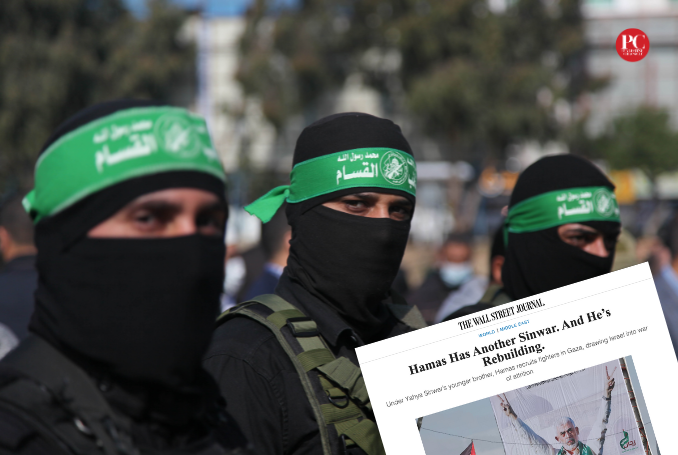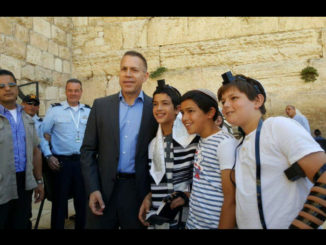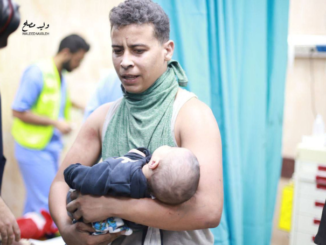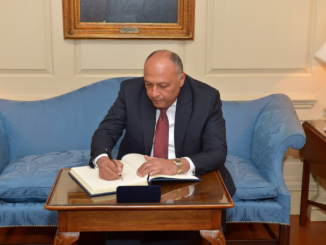
Mohammed Sinwar has largely “operated behind the scenes” earning him the nickname ‘Shadow,” according to the Wall Street Journal.
The younger brother of slain Hamas leader Yahya Sinwar is working to build the Resistance movement in Gaza, the Wall Street Journal (WSJ) has reported.
The recruitment drive by Mohammed Sinwar believed to be aged 50, poses “a fresh challenge” for the Israeli army in the besieged enclave, the report said on Monday.
Under Yahya Sinwar’s younger brother, Hamas is recruiting new fighters in Gaza, drawing Israel into a war of attrition https://t.co/H3cVMxa7U2
— The Wall Street Journal (@WSJ) January 13, 2025
The younger Sinwar who was considered close to his older brother joined Hamas at an early age. He also reportedly has a close connection with Mohammad Deif, the leader of the movement’s armed wing.
‘Working Hard to Find Him’
Unlike Yahya, the report said, Mohammed has not spent a significant amount of time in Israeli detention – unlike his brother – and has largely “operated behind the scenes” earning him the nickname ‘Shadow.”
“We are working hard to find him,” a senior Israeli official from the Southern Command, which runs the battle in Gaza, stated.
Israel annihilated & depopulated Northern Gaza, wiped out everything, cut off all water & food for months
Yet, they failed to defeat Hamas there; their militants are still ambushing the IDF & just killed 4 more soldiers in Beit Hanoun, an area the IDF claims to have "cleared" in… pic.twitter.com/wJVEynHTri
— Muhammad Shehada (@muhammadshehad2) January 12, 2025
Citing Israeli officials, the report stated that Mohammed Sinwar was one of the people responsible for the capture of an Israeli soldier, Gilad Shalit, in 2006. The capture led to his brother’s release in a prisoner swap five years later.
It further said that Mohammed Sinwar is now Hamas’s most senior commander in Gaza, along with Izz al-Din Haddad, the military head in northern Gaza, according to political analysts.
‘Up to 30,000 Fighters’
The WSJ report stated that Israel believed that Hamas had “up to 30,000 fighters arranged into 24 battalions in a structure that loosely resembled a state military.”
The Israeli army claims it has killed about 17,000 fighters, and detained thousands of others, the report added.
Hamas, however, has not stated how many of its fighters have been killed, and the “number of new Hamas recruits also remains unclear.”
Hamas ‘In Strong Position’
The report quotes Mohammed Sinwar as having written to ceasefire mediators late last year in which he said: “Hamas is in a very strong position to dictate its terms.”
In another message, he wrote: “If it is not a comprehensive deal that ends the sufferings of all Gazans and justifies their blood and sacrifices, Hamas will continue its fight.”
ABU OBEIDA:
Abu Obeida, the military spokesman for Al-Qassam Brigades, reported that their fighters inflicted heavy losses on the Israeli army, killing over 10 soldiers and injuring dozens in the past 72 hours.
He stated that the Israeli losses are far greater than reported,… pic.twitter.com/tdJOZECi03
— The Palestine Chronicle (@PalestineChron) January 13, 2025
Around 400 Israeli soldiers have been killed in the ongoing war in the Gaza Strip, according to the WSJ.
A retired Israeli brigadier general, Amir Avivi, has said “We are in a situation where the pace at which Hamas is rebuilding itself is higher than the pace that the IDF is eradicating them,” the report noted.
“Mohammed Sinwar is managing everything,” Avivi reportedly added.
Negotiations Continue
Qatar has handed Hamas and Israel a final draft of a ceasefire deal after a “breakthrough” in talks in the early hours of Monday, Reuters reported, citing an official close to the negotiations.
Those who participated in the talks reportedly included US President-elect Donald Trump’s envoy, the chiefs of Israel’s Mossad and Shin Bet intelligence agencies, Qatar’s prime minister, and officials from the Joe Biden administration.
“The next 24 hours will be pivotal to reaching the deal,” the official told Reuters.
Ongoing Genocide
The ongoing Israeli assault on the Gaza Strip, which began on October 7, 2023, has led to a humanitarian crisis of unprecedented scale. As the death toll among besieged and starved Palestinian civilians continues to rise daily, Israel is currently facing charges of genocide against Palestinians before the International Court of Justice (ICJ).
According to Gaza’s Ministry of Health, at least 46,584 Palestinians have been killed, and 109,731 wounded in Israel’s ongoing genocide in Gaza starting on October 7, 2023.
GAZA HEALTH MINISTRY: 46,584 Palestinians have been killed, and 109,731 wounded in Israel’s ongoing genocide in Gaza starting on October 7, 2023. pic.twitter.com/vISnaQlcSA
— The Palestine Chronicle (@PalestineChron) January 13, 2025
The toll is expected to rise further, with at least 11,000 people still unaccounted for, presumed dead under the rubble of their homes across Gaza.
The war, which Palestinians call “Operation Al-Aqsa Flood,” began after a military operation carried out by Hamas on Israeli territory. Israel reports that 1,139 of its soldiers and civilians were killed during the initial attack on October 7. However, Israeli media have raised concerns that a significant number of Israeli casualties were caused by ‘friendly fire’ during the assault.
Millions Displaced
Human rights organizations, both Palestinian and international, have reported that the overwhelming majority of the casualties in Gaza are women and children. The ongoing violence has also exacerbated an acute famine, with thousands of children among the dead, highlighting the severity of the humanitarian disaster.
The war has displaced nearly two million people from their homes across Gaza, with the majority of the displaced forced into the already overcrowded southern region of the Strip. The population in Gaza remains trapped in the ongoing conflict, with little access to basic necessities such as food, water, and medical care.
(The Palestine Chronicle)









Zionism must be defeated. This cease fire is part of the Mossad game plan
I agree. Never trust “Israel”.